7美国总统尼克松就职演说(1969年)
2019-2020年高中历史第5单元烽火连绵的局部战争第2课越南战争素材新人教版选修3

5.2越南战争【教学素材】1.阅读下列材料:材料一[第二次世界大战后,]美国同苏联,以及它们各自的盟国之间,都发生了直接的和全球性的对抗。
[它们]在各自的世界之间划分“边疆”,并且把它们的竞争扩大到了第三世界。
——[美]斯帕尼尔《第二次世界大战后美国的外交政策》材料二1954年《日内瓦协议》的有关内容:①自北纬17度分割南北越南。
②法国撤出越南,并承认它前殖民地三邦变为独立国。
③南北越为中立国家,不得与任何国家缔结军事同盟,不得进口军火,不得依附任何集团国家。
④南北越在1956年7月以前实行普选,由普选再统一南北越。
⑤各国尊重三邦独立和主权完整,不干涉三国内政。
材料三越南民主共和国是中国唇齿相依的邻邦,越南人民是中国人民亲如手足的兄弟,美国对越南民主共和国的侵犯,就是对中国的侵犯,中国人民决不会坐视不救。
——中华人民共和国政府声明(1964年8月6日) 请回答:(1)依据材料一和所学知识,概括第二次世界大战后世界格局的突出特点,并举例说明美苏“把它们的竞争扩大到了第三世界”。
答案:特点:第二次世界大战后形成了以美国为首的资本主义阵营和以苏联为首的社会主义阵营的对抗,美苏两极格局形成。
举例:如朝鲜战争、越南战争等。
(2)由材料二可知,越南分裂的主要原因是什么?文中的“三邦”是指哪三个国家?答案:《日内瓦协议》的规定。
三邦指越南、老挝、柬埔寨。
(3)结合材料三和所学知识,试分析越南战争越南胜利的原因。
答案:①越南人民抗美救国战争的正义性。
②得到了中国等世界各国人民的支持和声援。
③越南军民的顽强抗击。
解析:分析:本题考查学生阅读材料,并根据材料中的有效信息分析概括问题的能力。
第(1)题注意审题,不仅要求根据材料还要结合所学知识,二者都要兼顾。
第(2)题根据材料回答,材料二主要是《日内瓦协议》,抓住这一中心问题就迎刃而解了;第(3)题与第(1)题相同,既要结合材料又要兼顾所学知识。
答题时要做到要点化、条理化、规范化。
高考历史一轮复习 考点知识针对练 第26练 现代中国外交(含解析)-人教版高三全册历史试题
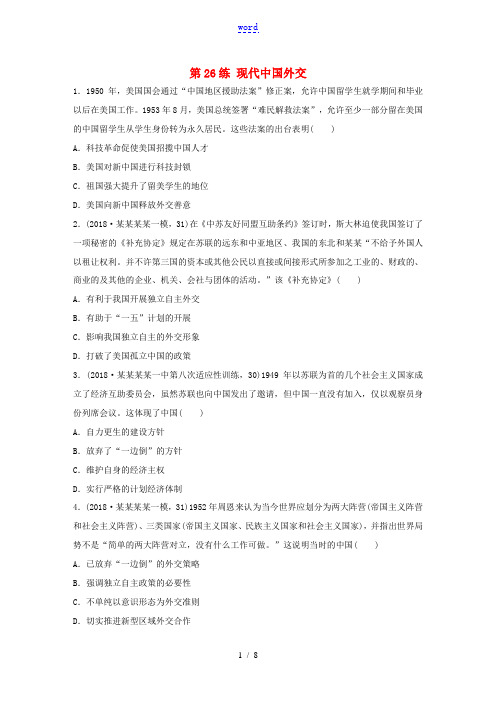
第26练现代中国外交1.1950年,美国国会通过“中国地区援助法案”修正案,允许中国留学生就学期间和毕业以后在美国工作。
1953年8月,美国总统签署“难民解救法案”,允许至少一部分留在美国的中国留学生从学生身份转为永久居民。
这些法案的出台表明( )A.科技革命促使美国招揽中国人才B.美国对新中国进行科技封锁C.祖国强大提升了留美学生的地位D.美国向新中国释放外交善意2.(2018·某某某某一模,31)在《中苏友好同盟互助条约》签订时,斯大林迫使我国签订了一项秘密的《补充协定》规定在苏联的远东和中亚地区、我国的东北和某某“不给予外国人以租让权利。
并不许第三国的资本或其他公民以直接或间接形式所参加之工业的、财政的、商业的及其他的企业、机关、会社与团体的活动。
”该《补充协定》( )A.有利于我国开展独立自主外交B.有助于“一五”计划的开展C.影响我国独立自主的外交形象D.打破了美国孤立中国的政策3.(2018·某某某某一中第八次适应性训练,30)1949年以苏联为首的几个社会主义国家成立了经济互助委员会,虽然苏联也向中国发出了邀请,但中国一直没有加入,仅以观察员身份列席会议。
这体现了中国( )A.自力更生的建设方针B.放弃了“一边倒”的方针C.维护自身的经济主权D.实行严格的计划经济体制4.(2018·某某某某一模,31)1952年周恩来认为当今世界应划分为两大阵营(帝国主义阵营和社会主义阵营)、三类国家(帝国主义国家、民族主义国家和社会主义国家),并指出世界局势不是“简单的两大阵营对立,没有什么工作可做。
”这说明当时的中国( )A.已放弃“一边倒”的外交策略B.强调独立自主政策的必要性C.不单纯以意识形态为外交准则D.切实推进新型区域外交合作5.(2018·某某某某高三模拟,31)1955年7月,美国通过英国向中国建议举行大使级会谈,中国表示同意。
8月1日,两国首次大使级会谈在日内瓦举行;9月10日双方就平民回国问题达成协议,钱学森由此踏上归国之路。
名人演讲:尼克松沉默的大多数TheGreatSilentMajority

名人演讲:尼克松沉默的大多数TheGreat Silent Majority演讲者简介:理查德·米尔豪斯·尼克松(Richard Milhous Nixon,1913年1月9日-1994年4月22日),第36任美国副总统(1953年-1961年)与第37任美国总统(1969年-1974年)。
尼克松是美国史上唯一当过两届总统与两届副总统的人,但也是唯一于在位期间,以辞职的方式离开总统职位的美国总统。
演讲背景介绍:1969年,美国深陷越南战争的泥潭,为了应付国内国外的压力弄的焦头烂额。
在越南,美军损兵折将,而在国内,反战运动风起云涌(看过《阿甘正传》的应该对反战运动的“盛况”有所认识)。
越战这个烫手的山芋于是如同现在的伊拉克一般,成了食之无味而弃之可惜的鸡肋。
当时的美国总统尼克松为了应对危局,在国内寻求广泛的人民的首肯,提出了“沉默的大多数”这个说法。
尼克松说,那些站出来游行示威、强烈反对越战、甚至攻击警察机关的人们,虽然显得声势浩大,但实际上却并非是多数,而绝大多数美国人的声音却被这些激进的呼喊所掩盖;绝大多数美国人都是爱国的,不希望国家走入颓势,只是种种原因,他们并未站出来表达自己的意见,而是处于沉默状态。
虽然,也有批评人士认为这是尼克松为自己的越战政策涂脂抹粉。
但他们也不得不承认,尼克松的这番话还真取得了不俗的效果,听过其演说的人,对他的支持率将近八成,而随后1972年的大选,尼克松以压倒性的胜利获得连任,也不能不提这“沉默的大多数”的功劳。
Good evening, my fellow Americans.晚上好!亲爱的同胞们:Tonight I want to talk to you on a subject of deep concernto all Americans and to many people in all parts of the world,the war in Vietnam.今晚,我想与各位探讨一个问题,这是所有美国人和全球无数人所深切关注的一个问题——越南战争。
1969年美国总统尼克松就职演说
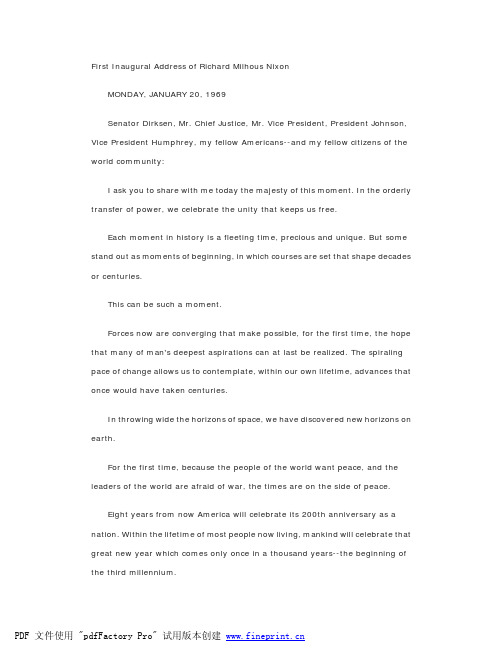
First Inaugural Address of Richard Milhous NixonMONDAY, JANUARY 20, 1969Senator Dirksen, Mr. Chief Justice, Mr. Vice President, President Johnson, Vice President Humphrey, my fellow Americans--and my fellow citizens of the world community:I ask you to share with me today the majesty of this moment. In the orderly transfer of power, we celebrate the unity that keeps us free.Each moment in history is a fleeting time, precious and unique. But some stand out as moments of beginning, in which courses are set that shape decades or centuries.This can be such a moment.Forces now are converging that make possible, for the first time, the hope that many of man's deepest aspirations can at last be realized. The spiraling pace of change allows us to contemplate, within our own lifetime, advances that once would have taken centuries.In throwing wide the horizons of space, we have discovered new horizons on earth.For the first time, because the people of the world want peace, and the leaders of the world are afraid of war, the times are on the side of peace.Eight years from now America will celebrate its 200th anniversary as a nation. Within the lifetime of most people now living, mankind will celebrate that great new year which comes only once in a thousand years--the beginning of the third millennium.What kind of nation we will be, what kind of world we will live in, whether we shape the future in the image of our hopes, is ours to determine by our actions and our choices.The greatest honor history can bestow is the title of peacemaker. This honor now beckons America--the chance to help lead the world at last out of the valley of turmoil, and onto that high ground of peace that man has dreamed of since the dawn of civilization.If we succeed, generations to come will say of us now living that we mastered our moment, that we helped make the world safe for mankind.This is our summons to greatness.I believe the American people are ready to answer this call.The second third of this century has been a time of proud achievement. We have made enormous strides in science and industry and agriculture. We have shared our wealth more broadly than ever. We have learned at last to manage a modern economy to assure its continued growth.We have given freedom new reach, and we have begun to make its promise real for black as well as for white.We see the hope of tomorrow in the youth of today. I know America's youth.I believe in them. We can be proud that they are better educated, more committed, more passionately driven by conscience than any generation in our history.No people has ever been so close to the achievement of a just and abundant society, or so possessed of the will to achieve it. Because our strengths are sogreat, we can afford to appraise our weaknesses with candor and to approach them with hope.Standing in this same place a third of a century ago, Franklin Delano Roosevelt addressed a Nation ravaged by depression and gripped in fear. He could say in surveying the Nation's troubles: "They concern, thank God, only material things."Our crisis today is the reverse.We have found ourselves rich in goods, but ragged in spirit; reaching with magnificent precision for the moon, but falling into raucous discord on earth.We are caught in war, wanting peace. We are torn by division, wanting unity. We see around us empty lives, wanting fulfillment. We see tasks that need doing, waiting for hands to do them.To a crisis of the spirit, we need an answer of the spirit.To find that answer, we need only look within ourselves.When we listen to "the better angels of our nature," we find that they celebrate the simple things, the basic things--such as goodness, decency, love, kindness.Greatness comes in simple trappings.The simple things are the ones most needed today if we are to surmount what divides us, and cement what unites us.To lower our voices would be a simple thing.In these difficult years, America has suffered from a fever of words; from inflated rhetoric that promises more than it can deliver; from angry rhetoric that fans discontents into hatreds; from bombastic rhetoric that postures instead of persuading.We cannot learn from one another until we stop shouting at oneanother--until we speak quietly enough so that our words can be heard as well as our voices.For its part, government will listen. We will strive to listen in new ways--to the voices of quiet anguish, the voices that speak without words, the voices of the heart--to the injured voices, the anxious voices, the voices that have despaired of being heard.Those who have been left out, we will try to bring in.Those left behind, we will help to catch up.For all of our people, we will set as our goal the decent order that makes progress possible and our lives secure.As we reach toward our hopes, our task is to build on what has gone before--not turning away from the old, but turning toward the new.In this past third of a century, government has passed more laws, spent more money, initiated more programs, than in all our previous history.In pursuing our goals of full employment, better housing, excellence in education; in rebuilding our cities and improving our rural areas; in protecting our environment and enhancing the quality of life--in all these and more, we will and must press urgently forward.We shall plan now for the day when our wealth can be transferred from the destruction of war abroad to the urgent needs of our people at home.The American dream does not come to those who fall asleep.But we are approaching the limits of what government alone can do.Our greatest need now is to reach beyond government, and to enlist the legions of the concerned and the committed.What has to be done, has to be done by government and people together or it will not be done at all. The lesson of past agony is that without the people we can do nothing; with the people we can do everything.To match the magnitude of our tasks, we need the energies of ourpeople--enlisted not only in grand enterprises, but more importantly in those small, splendid efforts that make headlines in the neighborhood newspaper instead of the national journal.With these, we can build a great cathedral of the spirit--each of us raising it one stone at a time, as he reaches out to his neighbor, helping, caring, doing.I do not offer a life of uninspiring ease. I do not call for a life of grim sacrifice.I ask you to join in a high adventure--one as rich as humanity itself, and as exciting as the times we live in.The essence of freedom is that each of us shares in the shaping of his own destiny.Until he has been part of a cause larger than himself, no man is truly whole.The way to fulfillment is in the use of our talents; we achieve nobility in the spirit that inspires that use.As we measure what can be done, we shall promise only what we know we can produce, but as we chart our goals we shall be lifted by our dreams.No man can be fully free while his neighbor is not. To go forward at all is to go forward together.This means black and white together, as one nation, not two. The laws have caught up with our conscience. What remains is to give life to what is in the law: to ensure at last that as all are born equal in dignity before God, all are born equal in dignity before man.As we learn to go forward together at home, let us also seek to go forward together with all mankind.Let us take as our goal: where peace is unknown, make it welcome; where peace is fragile, make it strong; where peace is temporary, make it permanent.After a period of confrontation, we are entering an era of negotiation.Let all nations know that during this administration our lines of communication will be open.We seek an open world--open to ideas, open to the exchange of goods and people--a world in which no people, great or small, will live in angry isolation.We cannot expect to make everyone our friend, but we can try to make no one our enemy.Those who would be our adversaries, we invite to a peacefulcompetition--not in conquering territory or extending dominion, but in enriching the life of man.As we explore the reaches of space, let us go to the new worldstogether--not as new worlds to be conquered, but as a new adventure to be shared.With those who are willing to join, let us cooperate to reduce the burden of arms, to strengthen the structure of peace, to lift up the poor and the hungry.But to all those who would be tempted by weakness, let us leave no doubt that we will be as strong as we need to be for as long as we need to be.Over the past twenty years, since I first came to this Capital as a freshman Congressman, I have visited most of the nations of the world.I have come to know the leaders of the world, and the great forces, the hatreds, the fears that divide the world.I know that peace does not come through wishing for it--that there is no substitute for days and even years of patient and prolonged diplomacy.I also know the people of the world.I have seen the hunger of a homeless child, the pain of a man wounded in battle, the grief of a mother who has lost her son. I know these have no ideology, no race.I know America. I know the heart of America is good.I speak from my own heart, and the heart of my country, the deep concern we have for those who suffer, and those who sorrow.I have taken an oath today in the presence of God and my countrymen to uphold and defend the Constitution of the United States. To that oath I now addthis sacred commitment: I shall consecrate my office, my energies, and all the wisdom I can summon, to the cause of peace among nations.Let this message be heard by strong and weak alike:The peace we seek to win is not victory over any other people, but the peace that comes "with healing in its wings"; with compassion for those who have suffered; with understanding for those who have opposed us; with the opportunity for all the peoples of this earth to choose their own destiny.Only a few short weeks ago, we shared the glory of man's first sight of the world as God sees it, as a single sphere reflecting light in the darkness.As the Apollo astronauts flew over the moon's gray surface on Christmas Eve, they spoke to us of the beauty of earth--and in that voice so clear across the lunar distance, we heard them invoke God's blessing on its goodness.In that moment, their view from the moon moved poet Archibald MacLeish to write:"To see the earth as it truly is, small and blue and beautiful in that eternal silence where it floats, is to see ourselves as riders on the earth together, brothers on that bright loveliness in the eternal cold--brothers who know now they are truly brothers."In that moment of surpassing technological triumph, men turned their thoughts toward home and humanity--seeing in that far perspective that man's destiny on earth is not divisible; telling us that however far we reach into the cosmos, our destiny lies not in the stars but on Earth itself, in our own hands, in our own hearts.We have endured a long night of the American spirit. But as our eyes catch the dimness of the first rays of dawn, let us not curse the remaining dark. Let us gather the light.Our destiny offers, not the cup of despair, but the chalice of opportunity. So let us seize it, not in fear, but in gladness-- and, "riders on the earth together," let us go forward, firm in our faith, steadfast in our purpose, cautious of the dangers; but sustained by our confidence in the will of God and the promise of man.我们都是地球的乘客-理查德-尼克松第一次就职演讲星期一,1969年1月20日历史的每一个时刻转瞬即逝,它既珍贵又独特。
初中历史练习题 2023年福建省泉州市安溪县中考历史二模试卷
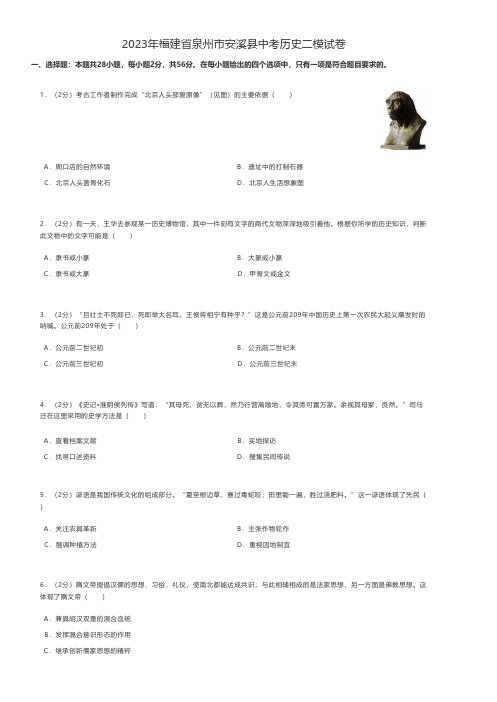
2023年福建省泉州市安溪县中考历史二模试卷一、选择题:本题共28小题,每小题2分,共56分。
在每小题给出的四个选项中,只有一项是符合题目要求的。
A.周口店的自然环境B.遗址中的打制石器C.北京人头盖骨化石D.北京人生活想象图1.(2分)考古工作者制作完成“北京人头部复原像”(见图)的主要依据( )A.隶书或小篆B.大篆或小篆C.隶书或大篆D.甲骨文或金文2.(2分)有一天,王华去参观某一历史博物馆,其中一件刻有文字的商代文物深深地吸引着他。
根据你所学的历史知识,判断此文物中的文字可能是( )A.公元前二世纪初B.公元前二世纪末C.公元前三世纪初D.公元前三世纪末3.(2分)“且壮士不死即已,死即举大名耳。
王侯将相宁有种乎?”这是公元前209年中国历史上第一次农民大起义爆发时的呐喊。
公元前209年处于( )A.查看档案文献B.实地探访C.找寻口述资料D.搜集民间传说4.(2分)《史记•淮阴侯列传》写道:“其母死,贫无以葬,然乃行营高敞地,令其旁可置万家。
余视其母冢,良然。
”司马迁在这里采用的史学方法是( )A.关注农具革新B.主张作物轮作C.强调种植方法D.重视因地制宜5.(2分)谚语是我国传统文化的组成部分。
“夏至根边草,赛过毒蛇咬;田里锄一遍,胜过浇肥料。
”这一谚语体现了先民( )A.兼具胡汉双重的混合血统B.发挥混合意识形态的作用C.继承创新儒家思想的精粹6.(2分)隋文帝提倡汉儒的思想、习俗,礼仪,使南北都能达成共识;与此相辅相成的是法家思想,另一方面是佛教思想。
这体现了隋文帝( )D.了解南北方劳动人民愿望A.体现出妇女地位的提高B.揭示了贵族生活的奢靡C.反映出开放的社会风气D.深受西方生活方式影响7.(2分)如图为唐朝的彩绘陶打马球女俑,唐朝的妇女经常骑马出游、打猎、打马球。
妇女骑马握弓的勃勃英姿常见于唐代的绘画和雕塑中。
这些现象( )A.金属货币交易量迅速增长B.唐宋商业活动不受时空限制C.唐宋外贸收入占重要地位D.宋代商业繁荣程度超过唐朝8.(2分)下表是唐宋发行铜币数目的统计表。
2023年安徽省中考历史质检检测试卷(一)
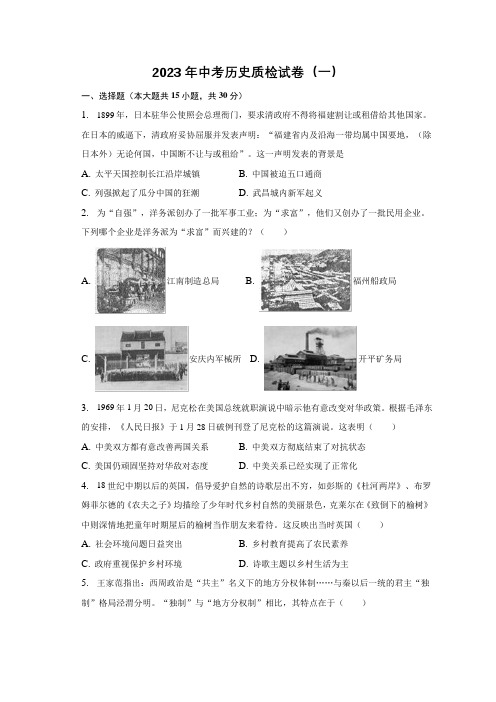
2023年中考历史质检试卷(一)一、选择题(本大题共15小题,共30分)1. 1899年,日本驻华公使照会总理衙门,要求清政府不得将福建割让或租借给其他国家。
在日本的威逼下,清政府妥协屈服并发表声明:“福建省内及沿海一带均属中国要地,(除日本外)无论何国,中国断不让与或租给”。
这一声明发表的背景是A. 太平天国控制长江沿岸城镇B. 中国被迫五口通商C. 列强掀起了瓜分中国的狂潮D. 武昌城内新军起义2. 为“自强”,洋务派创办了一批军事工业;为“求富”,他们又创办了一批民用企业。
下列哪个企业是洋务派为“求富”而兴建的?()A. 江南制造总局B. 福州船政局C. 安庆内军械所D. 开平矿务局3. 1969年1月20日,尼克松在美国总统就职演说中暗示他有意改变对华政策。
根据毛泽东的安排,《人民日报》于1月28日破例刊登了尼克松的这篇演说。
这表明()A. 中美双方都有意改善两国关系B. 中美双方彻底结束了对抗状态C. 美国仍顽固坚持对华敌对态度D. 中美关系已经实现了正常化4. 18世纪中期以后的英国,倡导爱护自然的诗歌层出不穷,如彭斯的《杜河两岸》、布罗姆菲尔德的《农夫之子》均描绘了少年时代乡村自然的美丽景色,克莱尔在《致倒下的榆树》中则深情地把童年时期屋后的榆树当作朋友来看待。
这反映出当时英国()A. 社会环境问题日益突出B. 乡村教育提高了农民素养C. 政府重视保护乡村环境D. 诗歌主题以乡村生活为主5. 王家范指出:西周政治是“共主”名义下的地方分权体制……与秦以后一统的君主“独制”格局泾渭分明。
“独制”与“地方分权制”相比,其特点在于()A. 地方的治理权力得到强化B. 地方长官由世袭产生C. 郡县长官由朝廷直接任命D. 县令由郡守直接任命6. 唐太宗曾说:“凡事皆需务本。
国以民为本,民以食为本。
凡营衣食,以不失时为本……”他治理国家的政策中,最能体现这一思想的是()A. 知人善任,鼓励大臣谏言B. 轻徭薄赋,减轻农民负担C. 制定法律,减省刑罚D. 整顿吏治,考核官吏7. 历朝历代都注重加强对西北边疆地区的管辖。
历届美国总统就职演说 中英双语
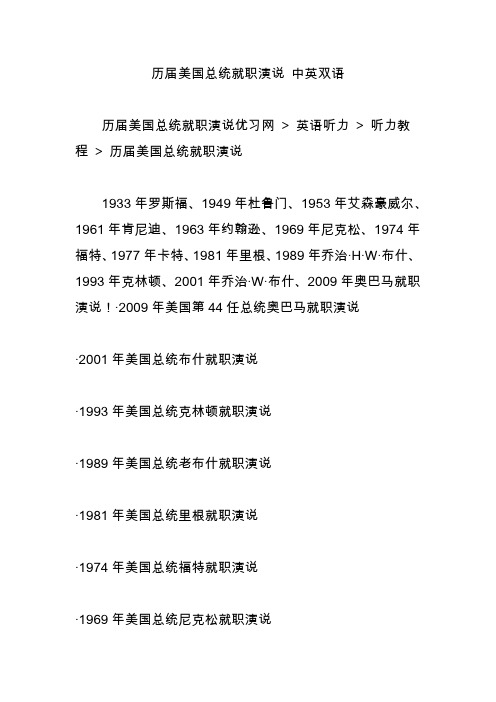
历届美国总统就职演说中英双语
历届美国总统就职演说优习网> 英语听力> 听力教程> 历届美国总统就职演说
1933年罗斯福、1949年杜鲁门、1953年艾森豪威尔、1961年肯尼迪、1963年约翰逊、1969年尼克松、1974年福特、1977年卡特、1981年里根、1989年乔治·H·W·布什、1993年克林顿、2001年乔治·W·布什、2009年奥巴马就职演说!·2009年美国第44任总统奥巴马就职演说
·2001年美国总统布什就职演说
·1993年美国总统克林顿就职演说
·1989年美国总统老布什就职演说
·1981年美国总统里根就职演说
·1974年美国总统福特就职演说
·1969年美国总统尼克松就职演说
·1961年美国总统肯尼迪就职演说·1965年美国总统约翰逊就职演说·1953年美国总统艾森豪威尔就职演说·1949年美国总统杜鲁门就职演说·1933年美国总统罗斯福就职演说·1974年美国总统福特就职演说。
尼克松总统就职演讲:为国家带来希望的时刻

尼克松总统就职演讲:为国家带来希望的时刻为国家带来希望的时刻尊敬的各位国会议员、联邦最高法院大法官、各位外宾以及所有美国人民:今天,我们在这里共同见证了一个令人振奋的时刻——我正式就任美利坚合众国总统。
我深感荣幸和谦逊地站在这个宏伟而富有历史意义的国会大厦的讲台上,与你们分享我对国家的愿景和期望。
我们的国家面临着重大的挑战。
经历了长期的内外困境,美国人民渴望找回自己的身份和自豪感。
我们的经济发展受到了困扰,就业率下降,通胀问题严重,社会不公平现象日益严重。
此外,冷战的阴霾继续笼罩着国际舞台,国与国之间的紧张局势时刻威胁着世界和平。
然而,尽管我们面临的困难重重,我坚信,这个时刻蕴含着巨大的希望。
因为我相信,只要我们团结一心,共同努力,我们就能够化解困境,为国家和人民带来更加美好的未来。
在经济方面,我们将致力于重振美国的经济实力。
我们将采取必要的措施,鼓励企业创新和投资,减少税负和繁琐的监管,改善商业环境。
同时,我们也会加大对教育、科技和基础设施的投资,以提高我们的人力资本和国家竞争力。
我们将努力实现全民就业,促进经济增长,消除贫困和不平等现象,让每个美国人都能够分享到国家繁荣的成果。
在国际事务中,我们将积极推动世界和平与合作。
我们将本着互相尊重和互利共赢的原则,与世界各国展开对话与合作,共同应对气候变化、恐怖主义、贫困等全球性挑战。
我们将坚守国际法治和多边主义原则,维护国际关系稳定,推动解决世界各地的冲突与纷争。
我们将加强与盟友的合作,拓展与新兴国家的伙伴关系,共同构建一个和平、稳定、繁荣的世界。
此外,为了重塑国家精神和凝聚人民力量,我们将加强国内的社会改革和文化建设。
我们将推动公民意识的培养,倡导公正、平等、宽容和尊重多元化的价值观。
我们将投入更多的资源,改善教育体系,提高人民的素质和能力。
我们将加大社会福利和医疗保障的覆盖范围,确保每个人都能够享受到基本的生活保障和公平的机会。
我要向所有美国人民发出呼吁:我们需要团结一心,共同为国家的未来努力奋斗。
- 1、下载文档前请自行甄别文档内容的完整性,平台不提供额外的编辑、内容补充、找答案等附加服务。
- 2、"仅部分预览"的文档,不可在线预览部分如存在完整性等问题,可反馈申请退款(可完整预览的文档不适用该条件!)。
- 3、如文档侵犯您的权益,请联系客服反馈,我们会尽快为您处理(人工客服工作时间:9:00-18:30)。
1969年美国总统尼克松就职演说First Inaugural Address of Richard Milhous NixonMONDAY, JANUARY 20, 1969Senator Dirksen, Mr. Chief Justice, Mr. Vice President, President Johnson, Vice President Humphrey, my fellow Americans--and my fellow citizens of the world community:I ask you to share with me today the majesty of this moment. In the orderly transfer of power, we celebrate the unity that keeps us free.Each moment in history is a fleeting time, precious and unique. But some stand out as moments of beginning, in which courses are set that shape decades or centuries.This can be such a moment.Forces now are converging that make possible, for the first time, the hope that many of man's deepest aspirations can at last be realized. The spiraling pace of change allows us to contemplate, within our own lifetime, advances that once would have taken centuries.In throwing wide the horizons of space, we have discovered new horizons on earth.For the first time, because the people of the world want peace, and the leaders of the world are afraid of war, the times are on the side of peace.Eight years from now America will celebrate its 200th anniversary as a nation. Within the lifetime of most people now living, mankind will celebrate that great new year which comes only once in a thousand years--the beginning of the third millennium.What kind of nation we will be, what kind of world we will live in, whether we shape the future in the image of our hopes, is ours to determine by our actions and our choices.The greatest honor history can bestow is the title of peacemaker. This honor now beckons America--the chance to help lead the world at last out of the valley of turmoil, and onto that high ground of peace that man has dreamed of since the dawn of civilization.If we succeed, generations to come will say of us now living that we mastered our moment, that we helped make the world safe for mankind.This is our summons to greatness.I believe the American people are ready to answer this call.The second third of this century has been a time of proud achievement. We have made enormous strides in science and industry and agriculture. We have shared our wealth more broadly than ever. We have learned at last to manage a modern economy to assure its continued growth.We have given freedom new reach, and we have begun to make its promise real for black as well as for white.We see the hope of tomorrow in the youth of today. I know America's youth. I believe in them. We can be proud that they are better educated, more committed, more passionately driven by conscience than any generation in our history.No people has ever been so close to the achievement of a just and abundant society, or so possessed of the will to achieve it. Because our strengths are so great, we can afford to appraise our weaknesses with candor and to approach them with hope.Standing in this same place a third of a century ago, Franklin Delano Roosevelt addressed a Nation ravaged by depression and gripped in fear. He could say in surveying the Nation's troubles: "They concern, thank God, only material things."Our crisis today is the reverse.We have found ourselves rich in goods, but ragged in spirit; reaching with magnificent precision forthe moon, but falling into raucous discord on earth.We are caught in war, wanting peace. We are torn by division, wanting unity. We see around us empty lives, wanting fulfillment. We see tasks that need doing, waiting for hands to do them.T o a crisis of the spirit, we need an answer of the spirit.T o find that answer, we need only look within ourselves.When we listen to "the better angels of our nature," we find that they celebrate the simple things, the basic things--such as goodness, decency, love, kindness.Greatness comes in simple trappings.The simple things are the ones most needed today if we are to surmount what divides us, and cement what unites us.T o lower our voices would be a simple thing.In these difficult years, America has suffered from a fever of words; from inflated rhetoric that promises more than it can deliver; from angry rhetoric that fans discontents into hatreds; from bombastic rhetoric that postures instead of persuading.We cannot learn from one another until we stop shouting at one another--until we speak quietly enough so that our words can be heard as well as our voices.For its part, government will listen. We will strive to listen in new ways--to the voices of quiet anguish, the voices that speak without words, the voices of the heart--to the injured voices, the anxious voices, the voices that have despaired of being heard.Those who have been left out, we will try to bring in.Those left behind, we will help to catch up.For all of our people, we will set as our goal the decent order that makes progress possible and our lives secure.As we reach toward our hopes, our task is to build on what has gone before--not turning away from the old, but turning toward the new.In this past third of a century, government has passed more laws, spent more money, initiated more programs, than in all our previous history.In pursuing our goals of full employment, better housing, excellence in education; in rebuilding our cities and improving our rural areas; in protecting our environment and enhancing the quality of life--in all these and more, we will and must press urgently forward.We shall plan now for the day when our wealth can be transferred from the destruction of war abroad to the urgent needs of our people at home.The American dream does not come to those who fall asleep.But we are approaching the limits of what government alone can do.Our greatest need now is to reach beyond government, and to enlist the legions of the concerned and the committed.What has to be done, has to be done by government and people together or it will not be done at all. The lesson of past agony is that without the people we can do nothing; with the people we can do everything.T o match the magnitude of our tasks, we need the energies of our people--enlisted not only in grand enterprises, but more importantly in those small, splendid efforts that make headlines in the neighborhood newspaper instead of the national journal.With these, we can build a great cathedral of the spirit--each of us raising it one stone at a time, as he reaches out to his neighbor, helping, caring, doing.I do not offer a life of uninspiring ease. I do not call for a life of grim sacrifice. I ask you to join in ahigh adventure--one as rich as humanity itself, and as exciting as the times we live in.The essence of freedom is that each of us shares in the shaping of his own destiny.Until he has been part of a cause larger than himself, no man is truly whole.The way to fulfillment is in the use of our talents; we achieve nobility in the spirit that inspires that use.As we measure what can be done, we shall promise only what we know we can produce, but as we chart our goals we shall be lifted by our dreams.No man can be fully free while his neighbor is not. To go forward at all is to go forward together.This means black and white together, as one nation, not two. The laws have caught up with our conscience. What remains is to give life to what is in the law: to ensure at last that as all are born equal in dignity before God, all are born equal in dignity before man.As we learn to go forward together at home, let us also seek to go forward together with all mankind.Let us take as our goal: where peace is unknown, make it welcome; where peace is fragile, make it strong; where peace is temporary, make it permanent.After a period of confrontation, we are entering an era of negotiation.Let all nations know that during this administration our lines of communication will be open.We seek an open world--open to ideas, open to the exchange of goods and people--a world in which no people, great or small, will live in angry isolation.We cannot expect to make everyone our friend, but we can try to make no one our enemy.Those who would be our adversaries, we invite to a peaceful competition--not in conquering territory or extending dominion, but in enriching the life of man.As we explore the reaches of space, let us go to the new worlds together--not as new worlds to be conquered, but as a new adventure to be shared.With those who are willing to join, let us cooperate to reduce the burden of arms, to strengthen the structure of peace, to lift up the poor and the hungry.But to all those who would be tempted by weakness, let us leave no doubt that we will be as strong as we need to be for as long as we need to be.Over the past twenty years, since I first came to this Capital as a freshman Congressman, I have visited most of the nations of the world.I have come to know the leaders of the world, and the great forces, the hatreds, the fears that divide the world.I know that peace does not come through wishing for it--that there is no substitute for days and even years of patient and prolonged diplomacy.I also know the people of the world.I have seen the hunger of a homeless child, the pain of a man wounded in battle, the grief of a mother who has lost her son. I know these have no ideology, no race.I know America. I know the heart of America is good.I speak from my own heart, and the heart of my country, the deep concern we have for those who suffer, and those who sorrow.I have taken an oath today in the presence of God and my countrymen to uphold and defend the Constitution of the United States. To that oath I now add this sacred commitment: I shall consecrate my office, my energies, and all the wisdom I can summon, to the cause of peace among nations.Let this message be heard by strong and weak alike:The peace we seek to win is not victory over any other people, but the peace that comes "with healing in its wings"; with compassion for those who have suffered; with understanding for those whohave opposed us; with the opportunity for all the peoples of this earth to choose their own destiny.Only a few short weeks ago, we shared the glory of man's first sight of the world as God sees it, as a single sphere reflecting light in the darkness.As the Apollo astronauts flew over the moon's gray surface on Christmas Eve, they spoke to us of the beauty of earth--and in that voice so clear across the lunar distance, we heard them invoke God's blessing on its goodness.In that moment, their view from the moon moved poet Archibald MacLeish to write:"T o see the earth as it truly is, small and blue and beautiful in that eternal silence where it floats, is to see ourselves as riders on the earth together, brothers on that bright loveliness in the eternal cold--brothers who know now they are truly brothers."In that moment of surpassing technological triumph, men turned their thoughts toward home and humanity--seeing in that far perspective that man's destiny on earth is not divisible; telling us that however far we reach into the cosmos, our destiny lies not in the stars but on Earth itself, in our own hands, in our own hearts.We have endured a long night of the American spirit. But as our eyes catch the dimness of the first rays of dawn, let us not curse the remaining dark. Let us gather the light.Our destiny offers, not the cup of despair, but the chalice of opportunity. So let us seize it, not in fear, but in gladness-- and, "riders on the earth together," let us go forward, firm in our faith, steadfast in our purpose, cautious of the dangers; but sustained by our confidence in the will of God and the promise of man.理查德-尼克松第一次就职演讲我们都是地球的乘客星期一,1969年1月20日历史的每一个时刻转瞬即逝,它既珍贵又独特。
